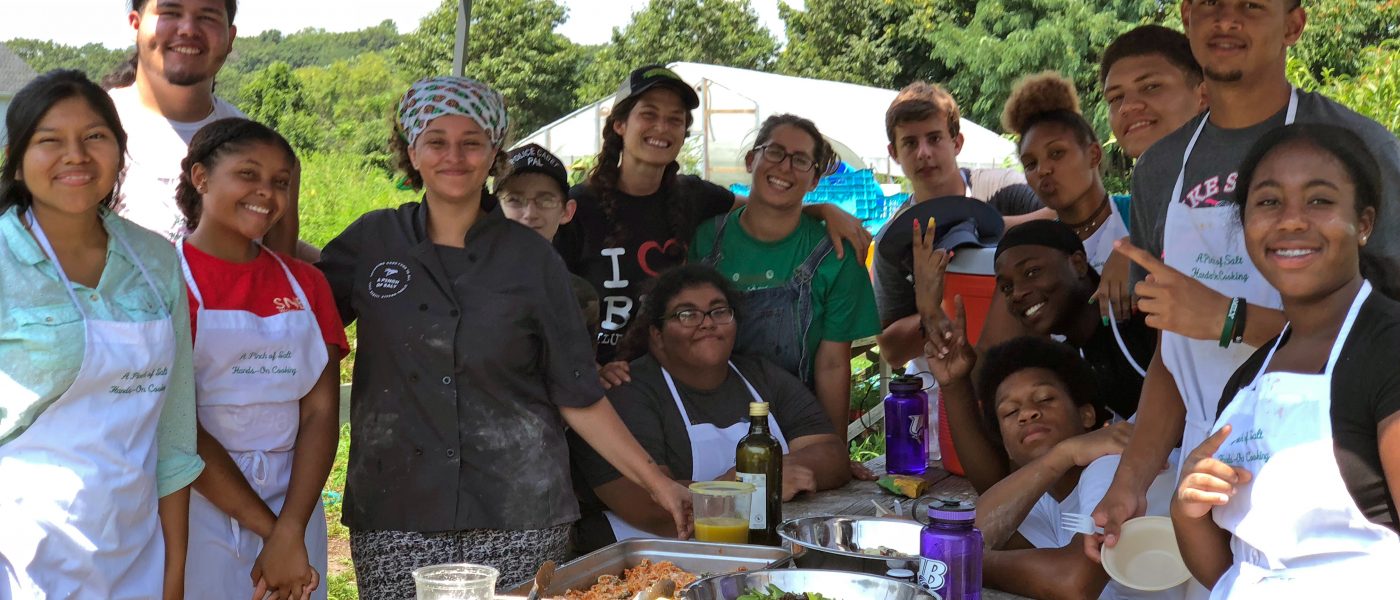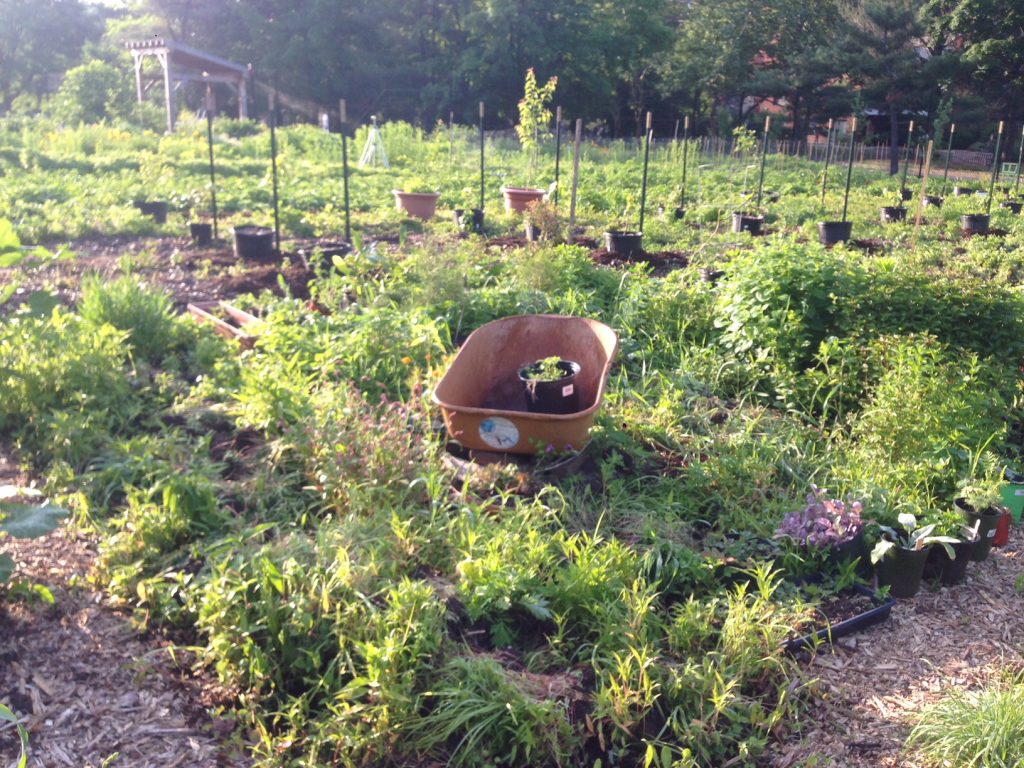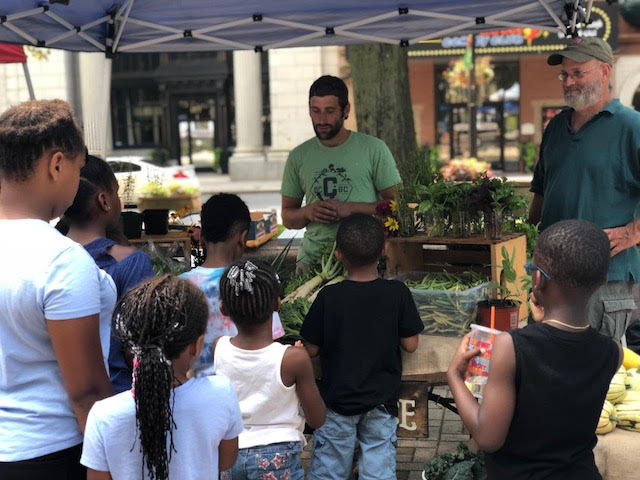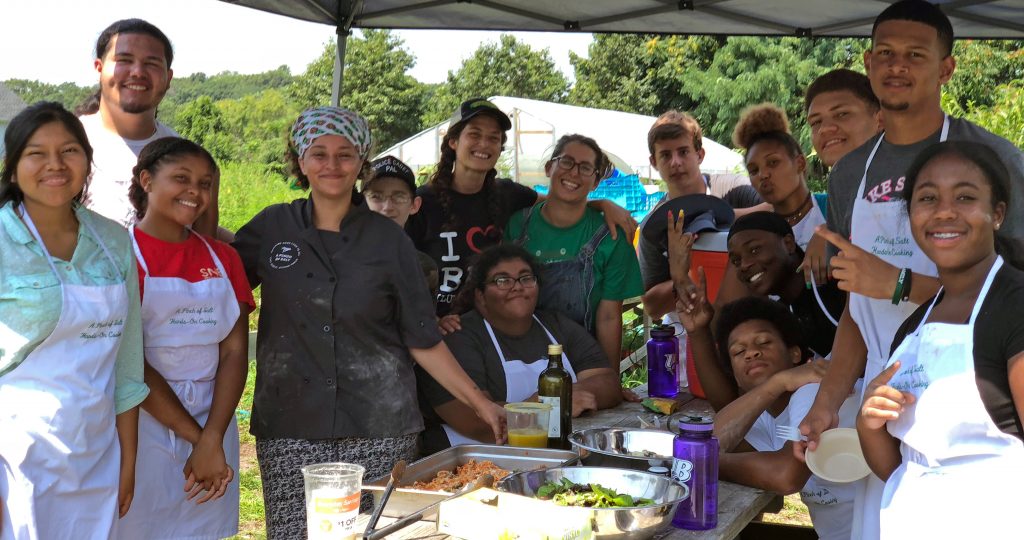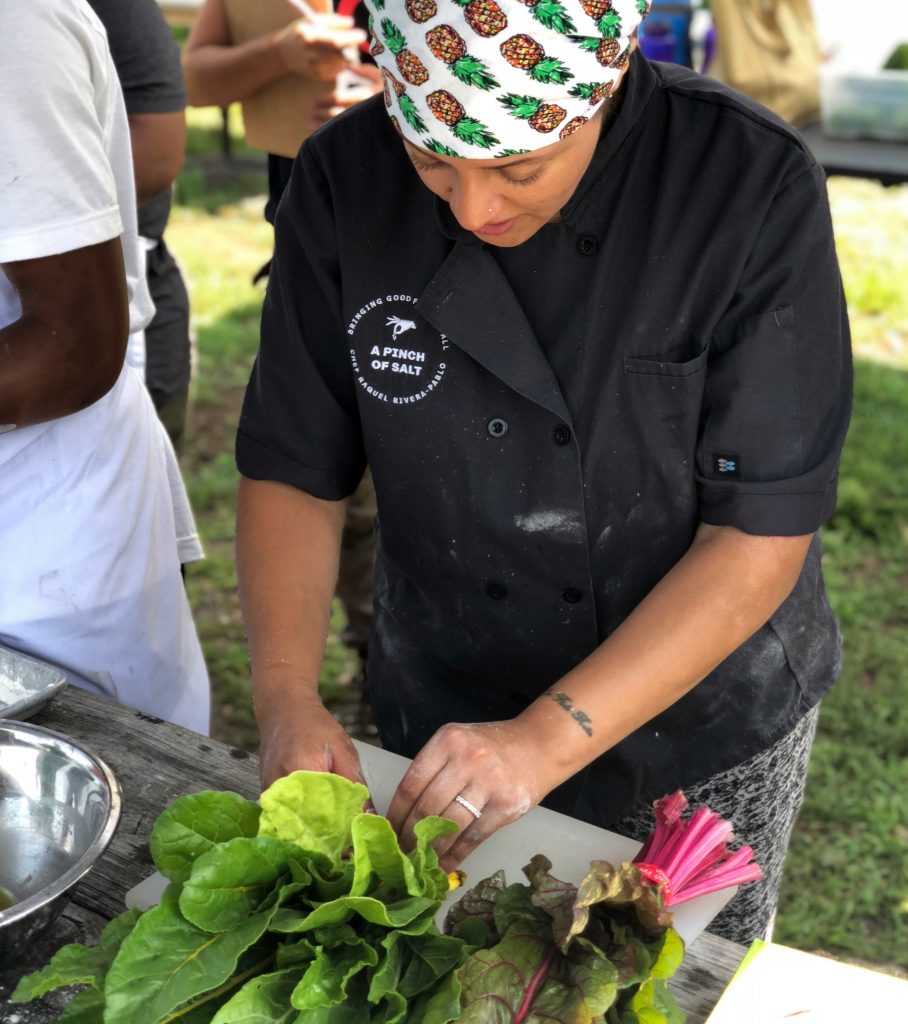Sometimes we’re asked why we move the Farm Aid festival to a new location every year. Wouldn’t it be easier for planning just to have it at the same venue every year? Absolutely, it would be! But, aside from giving fans in different regions the chance to experience Farm Aid, moving to a new area also lets us meet new farmers and organizations working on farm and food issues.
At the festival, we’ll introduce you to some of the new farmer heroes we’ve met, and below we’re proud to highlight three groups making positive change in Connecticut. KNOX, the Bridgeport Farmers Market Collaborative, and A Pinch of Salt’s Raquel Rivera-Pablo are spreading knowledge about growing food in urban environments, increasing access to good food, and fostering an appreciation for food from local farmers.
The interviews below have been edited for clarity and length.
KNOX, Inc.
Interview with Ron Pitz, Executive Director
Tell us about your (and your organization’s) work in Connecticut’s farm and food scene:
I feel that food is the great equalizer, as we all need to eat. No matter how much money we make, or what position in the community we hold, we all deserve to eat healthy food. That is why food justice is so important.
Knox manages 26 Community Gardens and Urban Farm sites, where 400 participants and their families grow 200 tons of fresh vegetables and fruit. We have have three fruit orchards in the city as well. Many of the gardens that we start are in food deserts and are used to grow fresh produce by people that would otherwise not be able to afford to buy it for their families.
Our Urban Farm program identifies growers in our community gardens who are doing a great job and who might want to start a business farming. We teach the farmers how to increase their yields and how to register with the Department of Agriculture to sell at farmers markets. Our partners at the University of Connecticut help train them in financing, raising specific crops and business planning. We help each farmer set up an LLC, and one farmer has already bought his own farm in a Hartford suburb.
In addition to growing local food in Hartford this is also an economic development program providing a better income for low income Hartford residents. Our farmers provide cilantro to a Mexican restaurant in Hartford, sell produce at Hartford farmers markets (including the one that we run at Knox, Frog Hollow Farmers Market) and they also sell fresh produce to the City of Hartford School System, which is then offered to school kids. We also do value-added products with our produce such as salsas and pepper relish. With our yield coming in at 200 tons, the City of Hartford Office of Sustainability named Knox as Hartford’s top food producer.
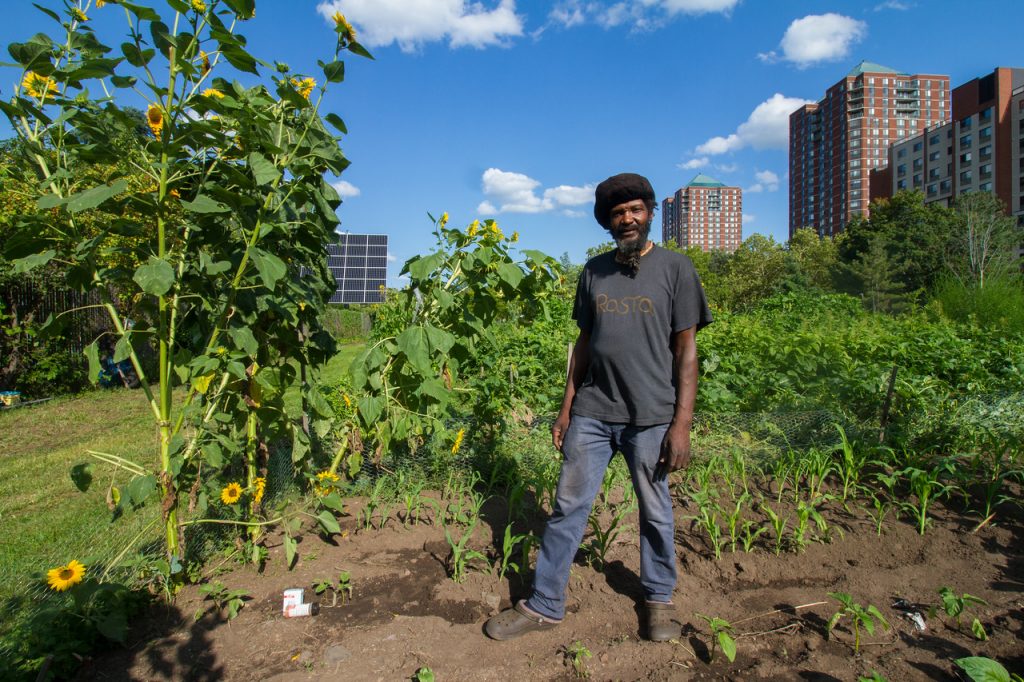
KNOX urban farmer Derrick. Photo by David Cappaert
How has your work, and the issues you focus on, evolved since you started?
It became more about growing local food and food justice rather than about giving people a space to have a tiny hobby farm.
What unique opportunities or challenges in Connecticut do you see while working in food and agriculture?
Connecticut has incredible soil as we are in the Connecticut River Valley. We are embracing an opportunity by using vacant lots in the city for productive farming and gardening. Also much of the farmland in Connecticut’s rural areas has been developed and has given its last crop, but there is a huge amount of land available in our cities. We need to get back to regional agriculture, where we can grow a large percentage of the food that we eat locally instead of the unsustainable practice of shipping our food great distances.
Congress is working on a Farm Bill this year. What would you like to see be a priority in it?
Support for family and small farms as well as organic farming.
Working on these issues sometimes feels like a never-ending uphill struggle. What keeps you motivated and inspired?
I am constantly inspired by the way that we change the lives of our participants and stakeholders by empowering them to raise their own healthy food. By doing that, we get them to embrace a healthy lifestyle that consists of eating a healthier diet, being outside getting the exercise that it takes to farm and garden and the camaraderie of gardening and farming side by side with your neighbors. Our gardens and farms are places that are very social.
Do you have a favorite local farm?
Sub Edge Farm in Farmington.
What food secret should Farm Aid festivalgoers be sure not to miss while they’re in Connecticut?
Our community gardens and the Mark Twain House on Farmington Ave in Hartford. It was where he penned some of his greatest books!
Is there anything else you’d like our readers to know about your work in Connecticut?
Just the amount of food that our gardeners and farmers grow in the City of Hartford. 200 tons. It amazes even me when I hear that number and I think it is conservative! We grow this much produce on about 30 acres of land and 10,000 square feet of greenhouse space.
Learn more about KNOX on their website
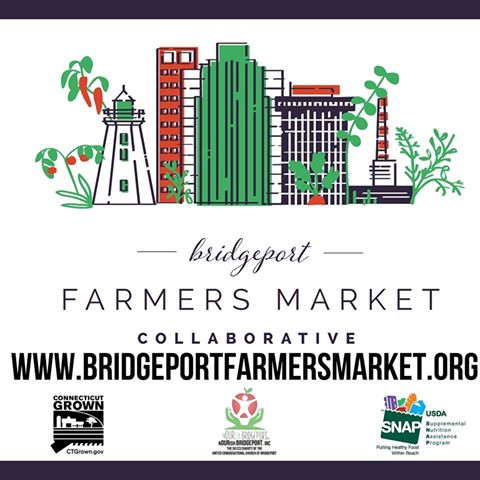
Bridgeport Farmers Market Collaborative
Interview with Janak Desai, Executive Director
Tell us about your (and your organization’s) work in Connecticut’s farm and food scene:
The Bridgeport Farmers’ Market Collaborative was established in 2014 and consists of seven independently-operated markets in Bridgeport, CT. Each market shares a common mission to increase access to healthy, local fruits and vegetables for all, regardless of income. BFMC meets on a monthly basis to undertake joint programming, fundraising, and marketing in support of member markets.
How has your work, and the issues you focus on, evolved since you started?
The goal of the BFMC is to increase access to locally grown vegetables and fruits to all in Bridgeport and the surrounding areas, no matter their economic status. We continue to focus on this mission and expanding on the number of people we are able to reach through marketing, outreach and incentive programs such as accepting Supplemental Nutrition Assistance Program (SNAP), Special Supplemental Nutrition Program for Women, Infants, and Children (WIC), and Senior Farmers’ Market Nutrition Program (SFMNP) incentives at all our markets. We also double SNAP and SFMNP purchases, which we find is a major benefit for those who might otherwise not be able to make healthy fresh produce purchases from local farmers.
What unique opportunities or challenges in Connecticut do you see while working in food and agriculture?
There is a great potential to make produce available from local farms to a wider population. More and more people are interested in shopping at farmers markets or directly through farms through CSAs and other such programs. However, there is still a large population that does not choose to, or does not have the means to make such choices. There is also renewed energy amongst new and mostly small farmers, who are growing organically, and who have the passion to move away from conventional agriculture. On the other hand, there is also loss of agricultural lands as aging farmers retire and do not have heirs who want to continue farming.
Congress is working on a Farm Bill this year. What would you like to see be a priority in it?
- Continue to support the incentive programs that help those who might not otherwise be able to, to purchase locally grown vegetables and fruits i.e. at farmers markets and local farms.
- Support organic and sustainable agriculture.
- Support local farms and farmers as opposed big agribusiness which often leads to consumption of nutritionally poor foods.
Working on these issues sometimes feels like a never-ending uphill struggle. What keeps you motivated and inspired?
Knowing that we’re making a difference even if it is one small step at a time!
What food secret should Farm Aid festival goers be sure not to miss while they’re in Connecticut?
They should definitely stop by one of our seven farmers markets!
Learn more about Bridgeport Farmers Market Collaborative on their website
A Pinch of Salt
Interview with Raquel Rivera-Pablo, Chef & Owner
Tell us about your (and your organization’s) work in Connecticut’s farm and food scene:
The Bridgeport Farmers Market hires my services to provide on-site cooking demos and samplings at each of our 7 farmers markets. APOS also does cooking demos in local community centers, senior centers, food pantries, schools to help raise awareness of the farmers markets and the Snap Match program.
How has your work, and the issues you focus on, evolved since you started?
When I first began, we only had two farmers markets in Bridgeport, that has now evolved to seven, with each located in a different town of Bridgeport. This has helped raise awareness and create diversity at our markets.
What unique opportunities or challenges in Connecticut do you see while working in food and agriculture?
As we have expanded there is a continuous need for education on farming, on food preparation and are making sure our markets are culturally sensitive to the community it supports.
Congress is working on a Farm Bill this year. What would you like to see be a priority in it?
Livable wages and proper conditions for farmers.
Working on these issues sometimes feels like a never-ending uphill struggle. What keeps you motivated and inspired?
The people I work with and service! I love the ah-ha moment when a customer tries a new vegetable or has a familiar vegetable prepared in a way that they would have never tried. I love helping farmers sell out of produce that would have risked the chance of not selling as people may not have been as familiar with that product. I love highlighting unique ingredients in my food presentations and creating a dish that represents our markets, our farmers and our community.
Do you have a favorite local farm?
Cecarelli Farms, as they were one of Bridgeport’s first farmers. I also enjoy Sweet Acre Farms and Fort Hill Farm.
What food secret should Farm Aid festivalgoers be sure not to miss while they’re in Connecticut?
Bridgeport is a melting pot, with seven unique farmers markets that each represent the community that it is located in. Within that count, we have two destination markets featuring artisans of all types and a celebration of art, music and culture.
Is there anything else you’d like our readers to know about your work in Connecticut?
We have formed a tight knit over the past few years thinking about where we are, where we wish to be, how do we service our community better, questions that continue to make us stronger and better as an organization working together and as a key component to Bridgeport!
